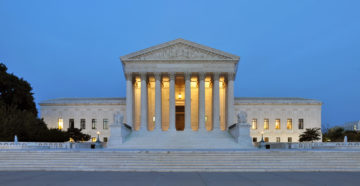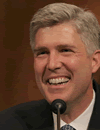On Monday March 27, 2023, the Supreme Court heard the case United States v. Hansen. The issue in the case is how broadly the government can limit expression that “encourages” or “induces” people to engage in illegal conduct. The Court has a chance to protect a wide range of speech by striking down or clarifying an unclear law that chills speech on a vast range of policy issues.
The case revolves around the activities of Helaman Hansen, who profited off of giving illegal immigrants false advice about staying in the United States illegally. While Hansen did many terrible things, one of the charges the government brought was for violating statute 8 U.S.C. 1324 by “inducing” or “encouraging” someone to violate U.S. immigration laws.
This statute, on its face, appears to criminalize a massive amount of speech protected by the First Amendment. For example, it is unclear whether posting on YouTube a video one knows will be seen by illegal immigrants saying that America is wonderful and everyone should stay here would violate the law. It is also unclear if a person who posts a sign saying a food bank is open to everyone regardless of immigration status is “inducing” someone to violate immigration law. Both of these cases involve speech that absolutely should be protected under the First Amendment.
The fact that the law does not clearly exclude these kinds of cases demonstrates its overbreadth. In Ashcroft v. Free Speech Coalition, the Supreme Court noted that the First Amendment protects people “from overbroad laws that chill speech within the First Amendment’s vast and privileged sphere.” This law has exactly that chilling potential.
To combat this argument, the government argues that the Court should narrowly construe Statute 1324 so that “encourage or induce” is read as intentionally soliciting or aiding or abetting criminal conduct. If accepted by the Court, this narrow construction might be able to avoid some of the overbreadth problems, but it would require the Court to read extra words into the statute that are not there.
There are three major issues with the government’s plea to the Court to narrowly reconstruct the statue in order to save it.
First, a reconstruction only makes sense when it aligns with the intent of Congress. However, it is not clear that Congress wrote the statute with the intent the government says it did. Courts normally assume that Congress made a conscious choice to use certain words rather than others, so changing the language could work directly against the intent of Congress. In this case, it seems that Congress intended to make it illegal to encourage or induce activity that violates immigration law because that is exactly what it wrote. If Congress intended to ban intentional solicitation, it presumably would have written that instead.
Second, if the Court makes a habit of narrowly reconstruing statutes for the government, it creates a perverse incentive. The government would be encouraged to test the limits and write many of its statutes using overly broad language, giving it the discretion to prosecute a wider range of people. Eventually, if someone goes to the massive time and expense to take the case all the way to the Supreme Court, the Court might read the statute narrowly to bail out the government without striking down the law. But, until then, the government would have a free hand to enforce unconstitutionally broad statutes.
Third, waiting for a definitive reconstruction of an overly broad statute would, in the lengthy interim, chill constitutionally protected speech. People decide to act by looking at the plain meaning of what the text of a law says. When a person sees the word “encourage” in the statute, it is impossible to know if the law refers to the ordinary meaning of “encourage,” or some future rewrite of uncertain dimension by the courts. “Encourage” is a broad term that can include the general sharing of knowledge or a friendly opinion.
As in this case, the government might later ask for a hidden reconstruction, where “encourage” is merely a shadow word representing intentional solicitation. But until then, we can expect that many if not most people will steer well-shy of anything that might be considered “encouragement.” And even after such a narrowing interpretation, the statue will remain on the books in its original language. Most people cannot reasonably be expected to consult case precedent and Court judgements to try to figure out if a law says what it actually seems to say.
The government argues that the statute has not chilled that many people by saying there have not been any prosecutions of individuals for violating this statute. But, as Justice Jackson suggested at oral argument, the government may not have cases to prosecute, because it might have already chilled individuals from speaking in ways that could subject them to prosecution. Chilled speech, by definition, is never expressed. So, it is extraordinarily hard, if not impossible, to quantify how much speech is chilled by a law. Moreover, just because the government has not prosecuted people in the past does not mean it will refrain from doing so in the future.
The government’s attempt to place the burden on individuals to amply demonstrate the chilling effect of a law is unreasonable. The Court should look to see if there is a reasonable likelihood that the plain meaning of a statute’s text could lead individuals to avoid speaking. If so, the First Amendment is implicated, and a hefty burden should be placed on the government to justify the law’s existence.
The Supreme Court in this case has a chance to deal a decisive blow against an overly broad law that threatens a wide range of speech protected under the First Amendment. The Court would set a bad precedent by narrowly reconstructing this law and should instead strike the law down and tell Congress to try again. Sometimes it’s better to euthanize bad laws than to resuscitate them.














